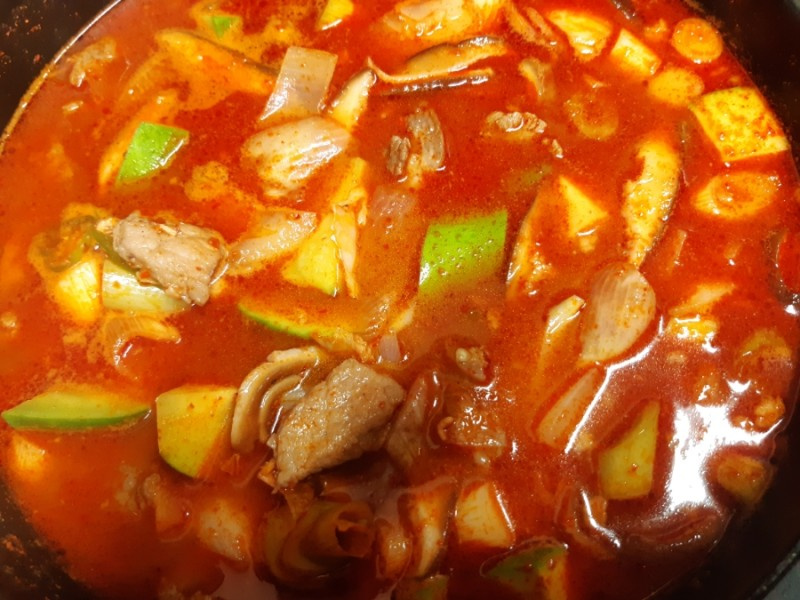Baek Jong-won’s Rich Pork Gochujang Stew Recipe
Pork Gochujang Stew with Deep Flavor, Featured on Korean Home Cooking Show

This pork gochujang stew is incredibly delicious, boasting a deep flavor achieved by stir-frying the gochujang for an extended period. Highly recommended!
Main Ingredients- Pork (for stew) 1.5 cups (approx. 200g)
- Onion 1/2 medium
- Zucchini 1 medium
- Shiitake Mushroom 1
- Green Onion 1/2 stalk
- Minced Garlic 1 Tbsp
- Cheongyang Pepper 1 (optional)
For Stir-frying Pork- Gochujang (Korean chili paste) 1 Tbsp
- Gochugaru (Korean chili flakes) 2 Tbsp
Seasoning & Broth- Cooking Oil 2 Tbsp
- Saeujeot (fermented shrimp) 2 Tbsp (including brine)
- Soup Soy Sauce 1 Tbsp
- Salt 1 Tbsp (for seasoning adjustment)
- Black Pepper a pinch
- Rice Water 1L
- Rice Water 1/2 cup (for consistency adjustment)
- Gochujang (Korean chili paste) 1 Tbsp
- Gochugaru (Korean chili flakes) 2 Tbsp
Seasoning & Broth- Cooking Oil 2 Tbsp
- Saeujeot (fermented shrimp) 2 Tbsp (including brine)
- Soup Soy Sauce 1 Tbsp
- Salt 1 Tbsp (for seasoning adjustment)
- Black Pepper a pinch
- Rice Water 1L
- Rice Water 1/2 cup (for consistency adjustment)
Cooking Instructions
Step 1
1. Wash the zucchini thoroughly, cut it in half lengthwise, and then slice it diagonally into large, bite-sized pieces (about 0.5cm thick). Triangular shapes also work well.

Step 2
2. Dice the half onion into large chunks. Slice the half green onion stalk diagonally. Thinly slice the shiitake mushroom after removing the tough stem. If you prefer a spicier stew, thinly slice the Cheongyang pepper.

Step 3
3. Heat 2 tablespoons of cooking oil in a pot or deep pan over medium-high heat. Add the pork and stir-fry until it’s well browned. Stir-frying the pork beforehand enhances its savory flavor.

Step 4
4. Once the pork is no longer pink and is partially cooked, reduce the heat to low. Add 1 tablespoon of saeujeot (fermented shrimp) and stir-fry it with the pork. The umami from the saeujeot will infuse into the pork, making it even tastier.

Step 5
5. Add a generous tablespoon of gochujang to the pot. Stir-fry over low heat, being careful not to burn it, for at least 1 minute. Stir-frying the gochujang for a longer time reduces any harshness and develops a deeper, richer flavor.

Step 6
6. If the mixture seems dry while stir-frying, add a tiny bit of water (about 2-3 tablespoons) at a time to prevent the gochujang from sticking to the bottom of the pot. Continue to stir-fry until most of the liquid from the gochujang has evaporated.

Step 7
7. Add 2 tablespoons of gochugaru (Korean chili flakes) and stir well to combine with the gochujang and pork. Cook for another 30 seconds to 1 minute, stirring constantly. Stir-frying the gochugaru enhances the stew’s color and spicy aroma.

Step 8
8. Pour in 1 liter of the prepared rice water and bring to a boil. Once boiling, add 1 tablespoon of soup soy sauce, the remaining 1 tablespoon of saeujeot, 1 tablespoon of salt (adjust to taste), and a pinch of black pepper. Stir to combine and adjust the seasoning. (Tip: Taste the broth first and add more salt or saeujeot if needed.)

Step 9
9. Add the sliced onion, zucchini, green onion, shiitake mushrooms, and Cheongyang pepper (if using) to the pot. Bring back to a boil over medium-high heat and cook for about 3 minutes, or until the vegetables are tender. (Tip: You can also add thinly sliced firm tofu for extra texture.)

Step 10
10. After simmering for 3 minutes, taste the stew again. Adjust the seasoning with salt or soup soy sauce if necessary. Your delicious pork gochujang stew is now ready! Enjoy it piping hot with a bowl of rice.



